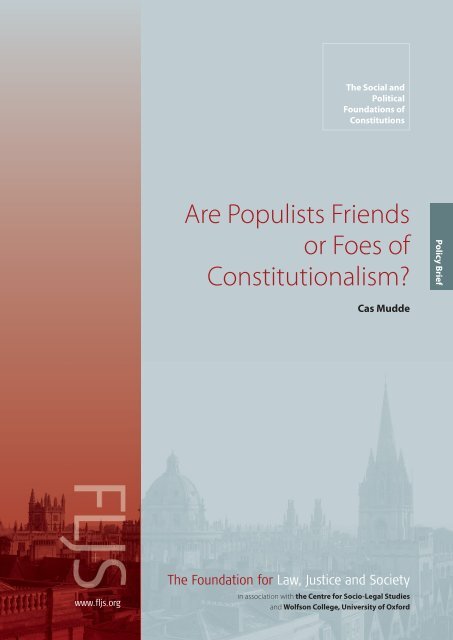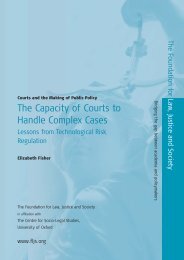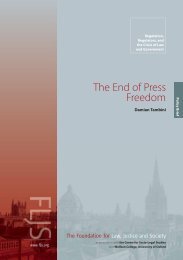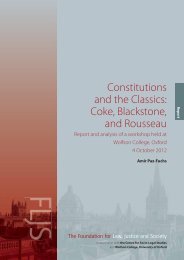Are Populists Friends or Foes of Constitutionalism? - Foundation for ...
Are Populists Friends or Foes of Constitutionalism? - Foundation for ...
Are Populists Friends or Foes of Constitutionalism? - Foundation for ...
Create successful ePaper yourself
Turn your PDF publications into a flip-book with our unique Google optimized e-Paper software.
The Social andPolitical<strong>Foundation</strong>s <strong>of</strong>Constitutions<strong>Are</strong> <strong>Populists</strong> <strong>Friends</strong><strong>or</strong> <strong>Foes</strong> <strong>of</strong><strong>Constitutionalism</strong>?Policy BriefCas MuddeThe <strong>Foundation</strong> f<strong>or</strong> Law, Justice and Societywww.fljs.<strong>or</strong>gin association with the Centre f<strong>or</strong> Socio-Legal Studiesand Wolfson College, University <strong>of</strong> Oxf<strong>or</strong>d
The <strong>Foundation</strong> f<strong>or</strong> Law, Justice and SocietyThe Social and Political <strong>Foundation</strong>s <strong>of</strong> ConstitutionsConstitutions take various f<strong>or</strong>ms in different societies, but essentially determine how policyissues, <strong>of</strong>ten <strong>of</strong> fundamental social imp<strong>or</strong>tance, are to be decided and implemented.Constitutions and constitutionalism are usually studied either doctrinally, as the source <strong>of</strong>fundamental legal doctrine, <strong>or</strong> conceptually, as the subject <strong>of</strong> philosophical methods <strong>of</strong>analysis. The approach <strong>of</strong> this programme <strong>of</strong>fers a third way: the study <strong>of</strong> constitutions andconstitutionalism in their social context, emphasizing their social character and role, theirsocial goals, and their links to other parts <strong>of</strong> society, especially economic and politicalaspects.Drawing on the research and literature <strong>of</strong> politics, economics, and sociology, theprogramme examines the concept and practice <strong>of</strong> representation, the legislative processand the character <strong>of</strong> modern administrative government, and the role <strong>of</strong> the judiciary inshaping constitutional instruments such as bills <strong>of</strong> rights.© The <strong>Foundation</strong> f<strong>or</strong> Law, Justice and Society 2013
Executive Summaryn Populism is best defined as a thin-centred ideology that considers society to beultimately separated into two homogeneous and antagonistic groups, ‘the pure people’versus ‘the c<strong>or</strong>rupt elite’, and which argues that politics should be an expression <strong>of</strong> thevolonté générale (general will) <strong>of</strong> the people.n While populism is essentially democratic, it is not liberal democratic. Principally,populism is a f<strong>or</strong>m <strong>of</strong> extreme maj<strong>or</strong>itarianism. Given that constitutionalism limits bothpopular sovereignty and maj<strong>or</strong>ity rule, populism is the<strong>or</strong>etically opposed toconstitutionalism.n In practice, however, populists take an opp<strong>or</strong>tunistic approach toward constitutions.While populists-in-opposition cling to the constitutional protection <strong>of</strong> their min<strong>or</strong>ityrights, they reject those <strong>of</strong> other min<strong>or</strong>ities on the basis <strong>of</strong> the democratic argument <strong>of</strong>maj<strong>or</strong>ity rule.n <strong>Populists</strong>-in-power have done the same, but, when able, have (significantly) ref<strong>or</strong>medthe constitution, most <strong>of</strong>ten strengthening maj<strong>or</strong>itarian institutions (like the executiveand referendums) and marginalizing counterbalancing powers and extra-politicalinstitutions.n The argument that populism is anti-democratic is unconvincing, and might ultimatelyreinf<strong>or</strong>ce the populist position. Rather, liberal democrats should emphasize the illiberalaspects <strong>of</strong> populism, while emphasizing the imp<strong>or</strong>tance <strong>of</strong> liberal aspects <strong>of</strong> thepolitical culture and system. In essence, they have to explain that min<strong>or</strong>ity rightsbenefit not just the min<strong>or</strong>ities, but also the maj<strong>or</strong>ity — if only because at one time theycould become a min<strong>or</strong>ity.n Opponents <strong>of</strong> populism should realize that f<strong>or</strong> most (potential) supp<strong>or</strong>ters, theyconstitute a part <strong>of</strong> the c<strong>or</strong>rupt elite. Consequently, vague and m<strong>or</strong>alizingcondemnations <strong>of</strong> populists, particularly when co<strong>or</strong>dinated between differentmainstream camps, will merely serve to confirm the populist message. Instead,populists should be confronted on the terms <strong>of</strong> the non-populists, based on evidenceand rational argument, not hyperbole and m<strong>or</strong>al condemnation.ARE POPULISTS FRIENDS OR FOES OF CONSTITUTIONALISM? . 1
<strong>Are</strong> <strong>Populists</strong> <strong>Friends</strong> <strong>or</strong> <strong>Foes</strong> <strong>of</strong><strong>Constitutionalism</strong>?IntroductionPopulism is fast becoming the favouritebogeyman <strong>of</strong> the Western elite <strong>of</strong> the still earlytwenty-first century. In an interview withFrankfurter Allgemeine Zeitung in 2010, in the midst<strong>of</strong> the w<strong>or</strong>st economic crisis in postwar Europe,European Union (EU) President Herman VanRompuy called populism ‘the greatest danger’ inEurope. This warning was recently echoed in theNew Y<strong>or</strong>k Times (15 October 2013), in both aninterview with Italian Prime Minister Enrico Lettaand a strong edit<strong>or</strong>ial on ‘Europe’s PopulistBacklash’. But the ‘threat’ <strong>of</strong> populism is not limitedto Europe. US administrations have warned <strong>of</strong> thethreat <strong>of</strong> the left-wing populist regimes <strong>of</strong> HugoChávez and Evo M<strong>or</strong>ales in Latin America, whilethe right-wing ‘populist anger’ <strong>of</strong> the Tea Party hasheld the w<strong>or</strong>ld under its spell in the recent USgovernment shutdown. In sh<strong>or</strong>t, populism is a(near) global menace.But while there is an almost universal consensuson the idea that populism is a maj<strong>or</strong> threat todemocracy, the exact nature <strong>of</strong> that alleged threat<strong>of</strong>ten remains vague. This is in part a consequence<strong>of</strong> the not<strong>or</strong>iously slippery concept <strong>of</strong> populism,which is broadly used, but has many differentmeanings in the political and public debate. F<strong>or</strong>many it is nothing m<strong>or</strong>e than the opp<strong>or</strong>tunisticdiscourse <strong>of</strong> demagogues, while others see it as amodern f<strong>or</strong>m <strong>of</strong> political extremism, rigid anddeeply ideological. This policy brief will reflect onthe phenomenon <strong>of</strong> populism, provide a cleardefinition, and discuss its relationship withdemocracy in general, and constitutionalism inparticular.The aim is to provide a clearer understanding <strong>of</strong>both populism and its alleged threat todemocracy. This is <strong>of</strong> crucial imp<strong>or</strong>tance f<strong>or</strong> tw<strong>or</strong>elated reasons. First, populism uses a stronglydemocratic discourse in which ‘the elite’ are attackedas being undemocratic. Hence, the supp<strong>or</strong>t <strong>of</strong>populist parties is based on supp<strong>or</strong>t f<strong>or</strong> a (genuine)democracy. Second, given that policymakers andpublic intellectuals are generally perceived as beingpart <strong>of</strong> ‘the elite’ by populists and their supp<strong>or</strong>ters,they cannot simply assume to have the m<strong>or</strong>al highground. Consequently, vague warnings andm<strong>or</strong>alistic condemnations are not going to w<strong>or</strong>k on(potential) supp<strong>or</strong>ters <strong>of</strong> populist politicians. Theywill have to be convinced by clear arguments whichdemonstrate that, whilst most populists might askthe right questions about their imperfect democraticsystems, they <strong>of</strong>ten provide the wrong answers.What is populism?The term populism is <strong>of</strong>ten ascribed to politicians,but seldom claimed by them. This is a reflection <strong>of</strong>the general negative connotation <strong>of</strong> the term, whichhas made it a powerful weapon in the politicaldomain. The label ‘populist’ is <strong>of</strong>ten used to excludegroups from the political mainstream: against thedemocratic and responsible ‘us’ stands theundemocratic and irresponsible populist ‘them’. Butwhat is it that makes certain groups populist? Weknow it is something political, but is it a politicalideology, movement, strategy, <strong>or</strong> style?Three meanings <strong>of</strong> populism are most dominant inthe public debate and all three are too vague andtoo broad. Firstly, populism is described as a f<strong>or</strong>m <strong>of</strong>irresponsible redistributive politics, in which leaders‘buy <strong>of</strong>f’ their supp<strong>or</strong>ters through state programmes,leading to massive budget deficits and economicmismanagement. Secondly, populism is used todescribe a certain leadership style, through whichcharismatic leaders mobilize and govern by directlyappealing to the people, without the mediation <strong>of</strong>political institutions like parties <strong>or</strong> parliaments.Thirdly, populism is <strong>of</strong>ten defined primarily as aspecific communication style that is overly2 . ARE POPULISTS FRIENDS OR FOES OF CONSTITUTIONALISM?
emotional and simplistic, pandering to ‘the commonman’ by using his language and symbols. While one<strong>or</strong> m<strong>or</strong>e <strong>of</strong> these features indeed apply to mostpopulist act<strong>or</strong>s, they do not set them apart fromnon-populists.In recent years, an increasing number <strong>of</strong> scholarshave come to define populism as an ideology <strong>or</strong>discourse. While the various details <strong>of</strong> the definitionsvary, almost all definitions share at least twocomponents: (1) a fundamental opposition between‘the people’ and ‘the elite’, and (2) populism is on theside <strong>of</strong> ‘the people’. Many definitions also stress theimp<strong>or</strong>tance <strong>of</strong> ‘common sense’ <strong>or</strong> the ‘general will’ <strong>of</strong>the people, explicitly <strong>or</strong> implicitly relating the latterto a Rousseauian understanding <strong>of</strong> democracy. Inline with this growing consensus within the field, Ipropose the following minimum definition: populismis a thin-centred ideology that considers society to beultimately separated into two homogeneous andantagonistic groups, ‘the pure people’ versus ‘thec<strong>or</strong>rupt elite’, and which argues that politics should bean expression <strong>of</strong> the volonté générale (general will) <strong>of</strong>the people. 1 This definition is broad enough toinclude all maj<strong>or</strong> populist phenomena, across regionand time, but narrow enough to exclude many other(non-populist) phenomena. Most imp<strong>or</strong>tantly,populism so defined has at least two fundamentaloppositions: elitism and pluralism. Consequently, itexcludes most political act<strong>or</strong>s and ideologies thatdominated politics bef<strong>or</strong>e the rise <strong>of</strong> democracy inthe late nineteenth century (e.g., monarchism,theocracy, conservatism) as well as those that havedominated democratic societies since then (e.g.,Christian democracy, liberalism, and socialdemocracy).Populism and democracyIn much <strong>of</strong> the public debate, populism is seen as athreat f<strong>or</strong> democracy. This is in line with mostscholarship on the topic, which had describedpopulism as a ‘democratic dis<strong>or</strong>der’, a ‘pathology <strong>of</strong>democracy’, and a ‘paranoid style <strong>of</strong> politics’. Amin<strong>or</strong>ity sees populism as democratic, and someeven as the ultimate f<strong>or</strong>m <strong>of</strong> democracy. F<strong>or</strong> all thepublic debate, the actual relationship betweenpopulism and democracy is, both in the<strong>or</strong>y andpractice, highly ambiguous and complex. 2The<strong>or</strong>etically, populism is not anti-democratic; itaccepts both popular sovereignty and maj<strong>or</strong>ity rule.It is, however, anti-liberal democratic. The fact thatmany auth<strong>or</strong>s use democracy as a sh<strong>or</strong>thand f<strong>or</strong>liberal democracy might explain the predominance<strong>of</strong> negative evaluations <strong>of</strong> populism in the literature.Populism is essentially anti–liberal democratic,because it opposes both the principle <strong>of</strong> pluralismand the practice <strong>of</strong> compromise. It is a monistideology, considering both ‘the people’ and the elite’as homogeneous and undivided. Thus, pluralism isfundamentally opposed, and min<strong>or</strong>ity rights areperceived as ‘special interests’ <strong>of</strong> ‘the elite’, which (inits zero-sum game w<strong>or</strong>ld) come at the expense <strong>of</strong>‘the people’. Populism theref<strong>or</strong>e also rejects thepolitics <strong>of</strong> compromise. It argues that politics canand should benefit all people. After all, ‘the people’are homogeneous and theref<strong>or</strong>e have similarinterests and n<strong>or</strong>ms. M<strong>or</strong>eover, being essentiallybased upon a m<strong>or</strong>al divide, f<strong>or</strong> populism,compromise means that ‘the pure’ are soiled by ‘thec<strong>or</strong>rupt’, which leads to the c<strong>or</strong>rupting <strong>of</strong> ‘the pure’.Consequently, populism supp<strong>or</strong>ts an extremistmaj<strong>or</strong>itarianism, even if the interests and n<strong>or</strong>ms <strong>of</strong>the maj<strong>or</strong>ity (i.e., the people) are <strong>of</strong>ten constructedby the populist leader. However, as the populistleader is part <strong>of</strong> the (homogeneous) people, unlikethe leaders <strong>of</strong> the other parties (who are part <strong>of</strong> theelite), his interests and n<strong>or</strong>ms are the same as those<strong>of</strong> the people.Populism puts its finger on the Achilles heel <strong>of</strong> liberaldemocracy, that is, the inherent tension betweenmaj<strong>or</strong>ity rule and min<strong>or</strong>ity rights. While democracy isbased on popular sovereignty and maj<strong>or</strong>ity rule,liberal democracy emphasizes restrictions on statepower and the constitutional protection <strong>of</strong> min<strong>or</strong>ityrights. Both liberal aspects can limit popularsovereignty and maj<strong>or</strong>ity rule. <strong>Populists</strong> squarelycome out on the side <strong>of</strong> democracy, which theyinterpret as ‘the power <strong>of</strong> the people and only thepower <strong>of</strong> the people.’ 3 Consequently, populismopposes any institutions <strong>or</strong> procedures that impedethe direct and full expression <strong>of</strong> the people’s voice.In practice, populists have both strengthened thedemocratic system in their country (e.g., M<strong>or</strong>ales inBolivia), and destroyed it (e.g., Fujim<strong>or</strong>i in Peru). Inline with the the<strong>or</strong>etical relationship, populists tendto mainly supp<strong>or</strong>t and strengthen democraticARE POPULISTS FRIENDS OR FOES OF CONSTITUTIONALISM? . 3
aspects <strong>of</strong> popular sovereignty and maj<strong>or</strong>ity rule,among others by including previously excluded <strong>or</strong>marginalized groups and supp<strong>or</strong>ting <strong>or</strong> usingplebiscitarian political instruments like referendumsand people initiatives. At the same time, they tend toundermine liberal features like min<strong>or</strong>ity protectionsand counterbalancing powers <strong>of</strong> the executive,which are accused <strong>of</strong> impeding the will <strong>of</strong> themaj<strong>or</strong>ity (<strong>or</strong> ‘general will’). But while they might havepushed f<strong>or</strong> an extreme f<strong>or</strong>m <strong>of</strong> maj<strong>or</strong>ity rule centredon a dominant executive, populists rarely sought theend to democracy as such (i.e., popular sovereigntyand maj<strong>or</strong>ity rule).The<strong>or</strong>y: Populism and constitutionalismIn contrast to populism and (liberal) democracy, littleattention has been paid to the the<strong>or</strong>eticalrelationship between populism andconstitutionalism. Most auth<strong>or</strong>s emphasize thatconstitutionalism centres on the idea <strong>of</strong> legalconstraint <strong>of</strong> coercive state power. The idea that(coercive) state power should be limited is afundamental element <strong>of</strong> liberal democracy, which iswhy several auth<strong>or</strong>s prefer the term constitutionaldemocracy. In essence, constitutionalism holds thatconstitutions are the ultimate f<strong>or</strong>mal source <strong>of</strong> stateauth<strong>or</strong>ity.It should come as no surprise that populism has aproblematic relationship with constitutionalism.Populism deems that nothing supersedes thegeneral will <strong>of</strong> the people and, consequently, no oneshould interfere with it. In this, populism subscribesto the classical conception <strong>of</strong> democracy, in which‘the laws <strong>of</strong> the republic express the unrestricted will<strong>of</strong> the unified people.’ 4 Essentially a f<strong>or</strong>m <strong>of</strong> extrememaj<strong>or</strong>itarianism, populism accepts no limitations topopular sovereignty and maj<strong>or</strong>ity rule, as itfundamentally rejects the existence <strong>of</strong> (legitimate)min<strong>or</strong>ities.F<strong>or</strong> populism everything is political, at leastpotentially. Nothing should be above the will <strong>of</strong> thepeople: not economics, not individuals, and not laws.Hence, populism fundamentally opposes theessence <strong>of</strong> constitutionalism, i.e., the constraint <strong>of</strong>state power. The idea that certain things are nonpolitical,in the sense that they are outside <strong>of</strong> thescope <strong>of</strong> maj<strong>or</strong>ity rule, is alien to populism. In sh<strong>or</strong>t,populism takes democracy to the extreme, <strong>or</strong> bringsit back to its classical conception, by arguing that thepeople can decide on everything by maj<strong>or</strong>ity rule.Practice: <strong>Populists</strong> and constitutionsWhile the relationship between populism andconstitutionalism is fairly clear in the<strong>or</strong>y, populistshave taken a broad variety <strong>of</strong> approaches toconstitutions in practice. In general, populists-inoppositionapproach constitutions opp<strong>or</strong>tunistically;when the constitution supp<strong>or</strong>ts their point, they willrevere it, but if it opposes their idea, they will denyits imp<strong>or</strong>tance. Similarly, their position towardsconstitutional judges is purely opp<strong>or</strong>tunistic.Depending upon the usefulness <strong>of</strong> their ruling, ajudge is branded as one <strong>of</strong> ‘the people’ <strong>or</strong> a member<strong>of</strong> ‘the elite’. <strong>Populists</strong>-in-power are similarlyopp<strong>or</strong>tunistic, clinging to the ‘sacred’ constitutionwhenever it serves their purpose, and criticizing <strong>or</strong>even changing it when it does not.The opp<strong>or</strong>tunistic position <strong>of</strong> populists-inoppositiontoward constitutions is nowhere asvisible as in the United States, where theConstitution is both an instrument and a symbol.This is perfectly exemplified by the Tea Party, whichpresents itself as the true defender <strong>of</strong> the USConstitution. F<strong>or</strong> example, the Declaration <strong>of</strong> TeaParty Independence, one <strong>of</strong> the few documents thatvirtually all Tea Party groups, Astroturf and grassroots, can agree on, identifies just three concrete‘sound policies’ that have made the United States ‘aland <strong>of</strong> prosperity and liberty’: fiscal responsibility,constitutionally limited government, and a belief inthe free market. M<strong>or</strong>e concretely, Tea Partiers believethat ‘The Constitution can solve all <strong>of</strong> the problemsplaguing our nation today.’ Tea Party groupsadvocate an <strong>or</strong>iginalist interpretation, which takesthe Constitution literally, that is, as the Framersintended.However, whenever the Constitution stands in theway <strong>of</strong> their desired goals, they have no problemwith calling f<strong>or</strong> changes to that same Constitution.4 . ARE POPULISTS FRIENDS OR FOES OF CONSTITUTIONALISM?
Take Senat<strong>or</strong> Mike Lee (R-Utah), one <strong>of</strong> the mainvoices <strong>of</strong> the recent government shutdown andattempt by Tea Partiers to f<strong>or</strong>ce a governmentdefault, who promised voters at a rally in 2010: ‘Ihereby pledge to you that I will not vote f<strong>or</strong> a singlebill that I can’t justify by the text and <strong>or</strong>iginalunderstanding <strong>of</strong> the Constitution.’ Yet, he has alsopublically criticized the Seventeenth Amendmentand called f<strong>or</strong> a change to the FourteenthAmendment. Asked how to square these positions,Lee said: ‘The Constitution was made to be amendedfrom time to time. Sometimes we have to change itto make it m<strong>or</strong>e true to the American dream’ (CNN, 7September 2010).Similar opp<strong>or</strong>tunistic positioning can be foundamong populists in other countries. The Belgianpopulist radical Right party Flemish Bloc (nowFlemish Interest, VB) explicitly defended‘constitutional democracy’ in its 2003 partyprogramme, arguing that ‘Flanders should not onlybe a democracy, it should also be a state <strong>of</strong> law. Thismeans that those in power are subject to the law (inthe broadest sense) and that they cannot takedecisions that go against the law and theConstitution.’ However, its passionate defence <strong>of</strong>constitutionalism seemed mainly self-serving, part <strong>of</strong>an (unsuccessful) attempt to prevent its convictionon the basis <strong>of</strong> the anti-racism law, as the VB hasconsistently rejected similar constitutionalprotections f<strong>or</strong> ‘Muslim fundamentalists’.<strong>Populists</strong>-in-power are as opp<strong>or</strong>tunistic towardconstitutions as populists-in-opposition are, andthose in power have m<strong>or</strong>e opp<strong>or</strong>tunities tochallenge the constitution — as well as the principledefenders <strong>of</strong> the constitution, the judges. Given thatfew populists ever have a constitutional maj<strong>or</strong>ity inparliament, changing the constitution is <strong>of</strong>ten not anoption. Instead, they ign<strong>or</strong>e constitutional provisionsand try to either change <strong>or</strong> intimidate the judges onthe constitutional court. However, constitutionalcourts have frequently proved much m<strong>or</strong>eindependent and powerful than populists hadexpected. In fact, in some cases judges were m<strong>or</strong>ef<strong>or</strong>midable adversaries than the oppositionpoliticians (f<strong>or</strong> example, in the cases <strong>of</strong> f<strong>or</strong>merItalian Prime Minister Silvio Berlusconi and SlovakPremier Vladimír Mečiar).If they do have the political power, populists willuse it to change the constitution. This has beenmost common in Latin America, where populistpresidents are <strong>of</strong>ten political outsiders, who cometo power rather suddenly and without well<strong>or</strong>ganizedpolitical <strong>or</strong>ganizations. Lacking politicalsupp<strong>or</strong>ters in other branches <strong>of</strong> government, theireff<strong>or</strong>ts are <strong>of</strong>ten frustrated by the nationallegislature, subnational bodies, extra-politicalagencies, and the constitutional court. The quickestway to marginalize these oppositional f<strong>or</strong>ces is bydirectly appealing to the people in a constitutionalreferendum. 5 Left-wing populist presidents inBolivia, Ecuad<strong>or</strong>, and Venezuela have successfullyargued that the old constitution protected thepower <strong>of</strong> the c<strong>or</strong>rupt (f<strong>or</strong>mer) elite and obstructedthe real rule <strong>of</strong> the people. The new constitutions,established through so-called ‘constituentassemblies,’ centralized political power in the <strong>of</strong>fice<strong>of</strong> the president and created new bodies thatundermined the power <strong>of</strong> the existingcountervailing powers, such as the nationallegislature and the constitutional court.The only European example <strong>of</strong> constitutionalref<strong>or</strong>m by populists-in-power directly is an extremecase: contemp<strong>or</strong>ary Hungary under the HungarianCivic Party (Fidesz) <strong>of</strong> Prime Minister Vikt<strong>or</strong> Orbán.Since having come to power f<strong>or</strong> the second time, in2010, Orbán has unleashed a level <strong>of</strong> maj<strong>or</strong>itarianrule previously unseen in postwar Europe. Themain target was the Constitution, attacked as aremnant <strong>of</strong> Hungary’s Communist past. Helped bya parliamentary supermaj<strong>or</strong>ity and some strategicnew appointments, Orbán steamrolled a newConstitution through parliament. While DeputyPrime Minister Tib<strong>or</strong> Navracsics heralded the newConstitution as ‘a foundation f<strong>or</strong> the spiritual andintellectual renewal <strong>of</strong> Hungary’ (Wall Street Journal,19 April 2011), most national and internationalobservers do not share his enthusiasm. In fact,experts agree that the new Constitution hasARE POPULISTS FRIENDS OR FOES OF CONSTITUTIONALISM? . 5
significantly weakened alternative centres <strong>of</strong> powerand entrenched Fidesz into power well beyond itscurrent legislative term.ConclusionI have argued that populism is best defined as a thincentredideology that considers society to beultimately separated into two homogeneous andantagonistic groups, ‘the pure people’ versus ‘thec<strong>or</strong>rupt elite’, and which argues that politics should bean expression <strong>of</strong> the volonté générale (general will) <strong>of</strong>the people. This definition is broad enough to includemost phenomena generally termed populist, yetprecise enough to exclude the vast maj<strong>or</strong>ity <strong>of</strong>political phenomena that are n<strong>or</strong>mally not associatedwith the term. Populism is a phenomenon closelyassociated with the rise <strong>of</strong> mass democracy, datingback to the late nineteenth century, and comes inmany guises.While populism is essentially democratic, it is notliberal democratic. In fact, with regard to the inherenttension within liberal democracy between democraticmaj<strong>or</strong>ity rule and liberal min<strong>or</strong>ity rights, populism issquarely with the f<strong>or</strong>mer. Essentially, populism is af<strong>or</strong>m <strong>of</strong> extreme maj<strong>or</strong>itarianism. Given thatconstitutionalism limits both popular sovereignty andmaj<strong>or</strong>ity rule, populism is fundamentally opposed toconstitutionalism — despite recent attempts tomerge the two into a doctrine <strong>of</strong> populistconstitutionalism. In practice, populists take anopp<strong>or</strong>tunistic approach toward constitutions. Whilepopulists-in-opposition cling to the constitutionalprotection <strong>of</strong> their min<strong>or</strong>ity rights, they reject those <strong>of</strong>other min<strong>or</strong>ities on the basis <strong>of</strong> the democraticargument <strong>of</strong> maj<strong>or</strong>ity rule. <strong>Populists</strong>-in-power havedone the same, but, when able, have (significantly)ref<strong>or</strong>med the constitution, most <strong>of</strong>ten strengtheningmaj<strong>or</strong>itarian institutions (like the executive andreferendums) and marginalizing counterbalancingpowers and extra-political institutions.Given the complex relationship between populismand democracy, it is crucial f<strong>or</strong> opponents <strong>of</strong>populism to criticize the actual weak points <strong>of</strong>populism. The argument that populism is antidemocraticis unconvincing, and might ultimatelyreinf<strong>or</strong>ce the populist position. After all, it is thepopulists who defend maj<strong>or</strong>ity rule much m<strong>or</strong>eradically than liberal democrats. Rather, liberaldemocrats have to emphasize the imp<strong>or</strong>tance <strong>of</strong>liberal aspects <strong>of</strong> the political culture and system —such as freedom <strong>of</strong> religion and speech;independence <strong>of</strong> the judiciary; institutional checksand balances. In essence, they have to explain thatmin<strong>or</strong>ity rights benefit not just the min<strong>or</strong>ities, butalso the maj<strong>or</strong>ity — if only because at one time theycould become a min<strong>or</strong>ity.M<strong>or</strong>eover, opponents <strong>of</strong> populism should realize thatf<strong>or</strong> most <strong>of</strong> the (potential) supp<strong>or</strong>ters <strong>of</strong> populism,mainstream voices in the media and politics are part<strong>of</strong> the c<strong>or</strong>rupt elite. Not only do they no longer holdthe m<strong>or</strong>al high ground, they are instinctivelydistrusted. Consequently, vague and m<strong>or</strong>alisticcondemnations <strong>of</strong> populism, particularly whenco<strong>or</strong>dinated between different mainstream camps,will merely serve to confirm the populist message.This co<strong>or</strong>dinated eff<strong>or</strong>t is cited by populists as ‘pro<strong>of</strong>’that the elite is homogeneous, merely faking internaldivision f<strong>or</strong> elect<strong>or</strong>al gain. This is used to bolster thepopulists’ own claims to being in the right andwielding influence, against which, the whole <strong>of</strong> theelite must unite to oppose them. M<strong>or</strong>e imp<strong>or</strong>tantly,they strengthen the populist argument that thepolitical is essentially m<strong>or</strong>al, which undermines thepossibilities f<strong>or</strong> compromise. In other w<strong>or</strong>ds,populists should be confronted on the terms <strong>of</strong> thenon-populist, but based on evidence and rationalarguments, rather than hyperbole and m<strong>or</strong>alcondemnation.6 . ARE POPULISTS FRIENDS OR FOES OF CONSTITUTIONALISM?
Notes1 See Cas Mudde, ‘The Populist Zeitgeist’, Government & Opposition, Vol. 39/3 (2004), 542-63.2 F<strong>or</strong> a collection <strong>of</strong> case studies on the relationship between populism and democracy, see Cas Mudde and Cristóbal Rovira Kaltwasser(eds.), Populism in Europe and the Americas. Threat <strong>or</strong> C<strong>or</strong>rective f<strong>or</strong> Democracy? Cambridge: Cambridge University Press, 2012.3 On populism and the tension <strong>of</strong> liberal democracy, see Yves Mény and Yves Surel, ‘The Constitutive Ambiguity <strong>of</strong> Populism’, in Yves Ményand Yves Surel (eds.), Democracies and the Populist Challenge. Basingstoke: Palgrave, 2002, pp. 1-21, at 9.4 Jürgen Habermas, ‘Constitutional Democracy: A Paradoxical Union <strong>of</strong> Paradoxical Principles?’, Political The<strong>or</strong>y, 29/6 (2001), 766-81, at 766.5 At the same time, populists have <strong>of</strong>ten introduced <strong>or</strong> extended direct democracy through constitutional ref<strong>or</strong>m.ARE POPULISTS FRIENDS OR FOES OF CONSTITUTIONALISM? . 7
8 . INTEGRATED WATER RESOURCES MANAGEMENT AND THE RIGHT TO WATER SECURITY
The <strong>Foundation</strong>The mission <strong>of</strong> the <strong>Foundation</strong> is to study, reflect on,and promote an understanding <strong>of</strong> the role that lawplays in society. This is achieved by identifying andanalysing issues <strong>of</strong> contemp<strong>or</strong>ary interest andimp<strong>or</strong>tance. In doing so, it draws on the w<strong>or</strong>k <strong>of</strong>scholars and researchers, and aims to make its w<strong>or</strong>keasily accessible to practitioners and pr<strong>of</strong>essionals,whether in government, business, <strong>or</strong> the law.Cas Mudde is an Assistant Pr<strong>of</strong>ess<strong>or</strong> in theDepartment <strong>of</strong> International Affairs at the University<strong>of</strong> Ge<strong>or</strong>gia in Athens (USA). He is an internationallyrecognized expert on extremism and democracy inWestern democracies, focusing particularly onpopulism and the far Right. Among his publicationsare The Ideology <strong>of</strong> the Extreme Right (ManchesterUniversity Press, 2000), Populist Radical Right Partiesin Europe (Cambridge University Press, 2007), and(with Cristóbal Rovira Kaltwasser) Populism in Europeand the Americas. Threat <strong>or</strong> C<strong>or</strong>rective f<strong>or</strong> Democracy?(Cambridge University Press, 2012). He has recentlystarted a new project on the radical environmentalistand animal rights movement and state repression inWestern democracies.F<strong>or</strong> further inf<strong>or</strong>mation please visitour website at www.fljs.<strong>or</strong>g<strong>or</strong> contact us at:The <strong>Foundation</strong> f<strong>or</strong> Law, Justice and SocietyWolfson CollegeLinton RoadOxf<strong>or</strong>d OX2 6UDT . +44 (0)1865 284433F . +44 (0)1865 284434E . info@fljs.<strong>or</strong>gW . www.fljs.<strong>or</strong>gwww.fljs.<strong>or</strong>g






![Pirie Report [3]:Layout 1 - Foundation for Law, Justice and Society](https://img.yumpu.com/33886189/1/184x260/pirie-report-3layout-1-foundation-for-law-justice-and-society.jpg?quality=85)